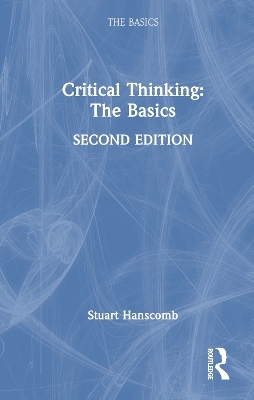
Critical Thinking: The Basics
Seiten
2023
|
2nd edition
Routledge (Verlag)
978-1-032-16301-7 (ISBN)
Routledge (Verlag)
978-1-032-16301-7 (ISBN)
An accessible and engaging introduction to the field of critical thinking, drawing on philosophy, communication and psychology. Revised and updated throughout it is essential read for students approaching the field of critical thinking for the first time.
Critical Thinking: The Basics is an accessible and engaging introduction to the field of critical thinking, drawing on philosophy, communication, and psychology. Emphasising its relevance both to academic literacy and to decision-making in a range of contexts, this book introduces and explains the knowledge, methods, and skills needed to identify and avoid poor reasoning, reconstruct and evaluate arguments, and engage constructively in dialogues.
Topics covered include:
The relationship between critical thinking, emotions, and the psychology of persuasion
The role of character dispositions such as open-mindedness, courage, and self-knowledge
Argument identification and reconstruction
Fallacies and argument evaluation.
This second edition has been revised and updated throughout, and includes an additional chapter on the relationship between critical thinking and emotions. There are also new sections on concepts such as the ‘experiential mind’ and ‘need for cognitive closure’, and contemporary examples drawn from issues including conspiracy theories, the pandemic, and misuses of social media.
With updated and expanded discussion questions/exercises and suggestions for further reading at the end of each main chapter, this book is an essential read for students approaching the field of critical thinking for the first time, and for the general reader wanting to improving their thinking skills and decision-making abilities.
Critical Thinking: The Basics is an accessible and engaging introduction to the field of critical thinking, drawing on philosophy, communication, and psychology. Emphasising its relevance both to academic literacy and to decision-making in a range of contexts, this book introduces and explains the knowledge, methods, and skills needed to identify and avoid poor reasoning, reconstruct and evaluate arguments, and engage constructively in dialogues.
Topics covered include:
The relationship between critical thinking, emotions, and the psychology of persuasion
The role of character dispositions such as open-mindedness, courage, and self-knowledge
Argument identification and reconstruction
Fallacies and argument evaluation.
This second edition has been revised and updated throughout, and includes an additional chapter on the relationship between critical thinking and emotions. There are also new sections on concepts such as the ‘experiential mind’ and ‘need for cognitive closure’, and contemporary examples drawn from issues including conspiracy theories, the pandemic, and misuses of social media.
With updated and expanded discussion questions/exercises and suggestions for further reading at the end of each main chapter, this book is an essential read for students approaching the field of critical thinking for the first time, and for the general reader wanting to improving their thinking skills and decision-making abilities.
Stuart Hanscomb is a Senior Lecturer in Philosophy and Communication at the University of Glasgow, UK. With Benjamin Franks and Sean Johnston he is author of Environmental Ethics and Behavioural Change, also available from Routledge.
Introduction 1. Rationality, biases and emotions 2. Emotions 3. Critical Thinking and Dispositions 4. Arguments and argument reconstruction 5. Argument forms and fallacies 6. Arguments referring to expertise, power, and message source (I) 7. Arguments referring to expertise, power, and message source (II) 8. Causal arguments, generalisations, arguments from consequences and slippery slope arguments 10. Further fallacies Conclusion. Glossary References Index
| Erscheinungsdatum | 11.07.2023 |
|---|---|
| Reihe/Serie | The Basics |
| Verlagsort | London |
| Sprache | englisch |
| Maße | 129 x 198 mm |
| Gewicht | 400 g |
| Themenwelt | Geisteswissenschaften ► Philosophie ► Logik |
| ISBN-10 | 1-032-16301-1 / 1032163011 |
| ISBN-13 | 978-1-032-16301-7 / 9781032163017 |
| Zustand | Neuware |
| Informationen gemäß Produktsicherheitsverordnung (GPSR) | |
| Haben Sie eine Frage zum Produkt? |
Mehr entdecken
aus dem Bereich
aus dem Bereich
ein Gegenentwurf zum kurzfristigen Denken : so werden wir zu den …
Buch | Hardcover (2023)
REDLINE (Verlag)
CHF 27,90


